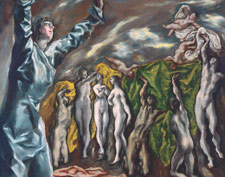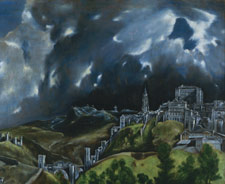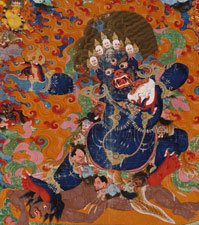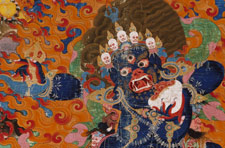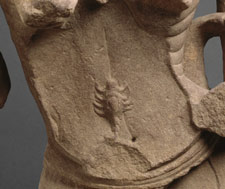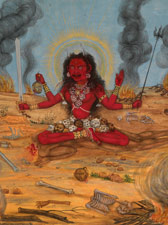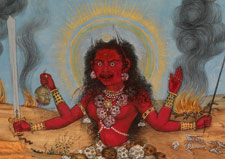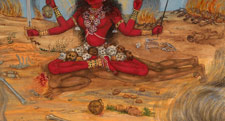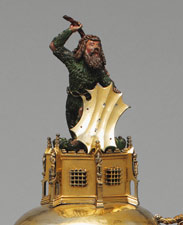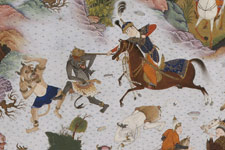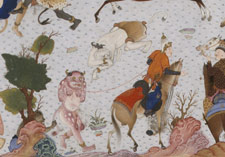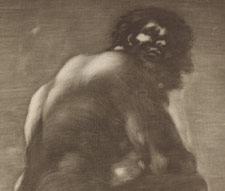New Connections appear every Wednesday. Sign up for a reminder.
Islamic art curator Navina Haidar contemplates the power of objects that are darkly energetic.
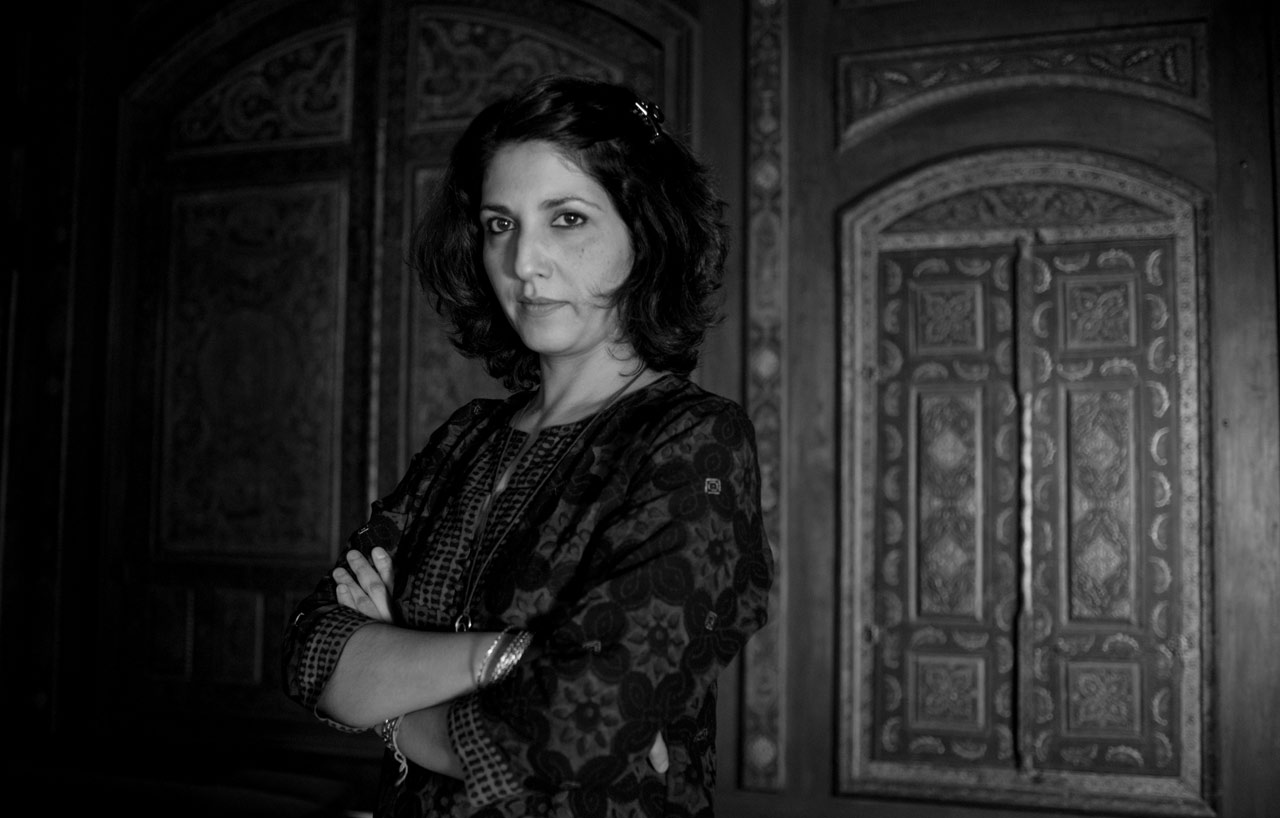 1280818
1280818 7231024
7231024 8291024
8291024 6131024
6131024 9101024
9101024 12801006
12801006 9141024
9141024 12541024
12541024 1280998
1280998 7131024
7131024 9071024
9071024 1280839
1280839 7221024
7221024 12211024
12211024 1280886
1280886 7641024
7641024 1280905
1280905 1280690
1280690 1280928
1280928 6031024
6031024 8351024
8351024 6621024
6621024 6611024
6611024 1061705
1061705 848592
848592 7561024
7561024 12081024
12081024 1280839
1280839
My name is Navina Haidar and I'm a curator in the Islamic department. I'm going to be exploring the question of "dark energy." It becomes apparent
that certain works of art are all the more compelling, and all the more riveting, because they
radiate something that we can call "dark energy," that's not negative, but
really represents a kind of power. Either the subject matter being extraordinary and sometimes disturbing;
a mood that's captured; or a kind of
restlessness in the minds of these artists that is often expressed in their work.
El Greco's skies above Toledo: that white edge around the clouds brings
this electric light filled with some kind of supernatural energy which is bursting forth from his canvases.
The sense of mystery in this painting is quite strong. The contrast between darkness and light, the isolation of the little figure. When I learned it was in fact a border, a somewhat contested border between Israel and Lebanon here, it made it all the more interesting and meaningful as an image, but even without that knowledge it's still a very, very powerful image.
The Tibetan image of the god of death, Yama, is really the incorporation of all the processes of the universe. Creation, preservation, and destruction.
When you see a fierce image like this, you're not meant to be terrified. Recognizing
them in some sense is a way of accepting them, and worshiping them, and realizing that they will come, just as the other forces will.
This Chamunda sculpture is clearly terrifying, but to me what's so darkly energetic about it
is that little scorpion image, to our very small human point of view, unnerves you more than the whole deity itself. This most fantastic
painting portrays the goddess Bhaivari, which is the fierce manifestation of Shiva.
What's so powerful about it is the fact that something that's utterly unreal has been articulated or expressed in a way that is so realistic. Her
lips which spew blood are drawn back revealing teeth. Her eyes bulge and of course they're not real eyes and neither are the spear-tipped horns that emerge from her head.
If you look at the way that corpse's toes are tensed, it's as though the life has just gone out of him.
There's an obvious psychological association between certain types of images and dark energy even if they're not dark images so to speak. This Great Indian Fruit Bat probably led a very innocent life eating mangoes and lychees, and yet because we insist on associating bats with darkness, we can't help thinking, "Well, there's a dark scary bat."
I love the thought of this posh European world, just about to enter the Renaissance, where there's going to be beautiful things happening on every level of society. But this little
dark man makes you suddenly feel that wildness and darkness and savagery is right 'round the corner, and no matter how beautifully gilded your vessel below is, that reminder of another world, far more elemental, is so brilliantly kind of conveyed.
The still life with the skull, which contrasts of course with all those symbols of wealth and life around it. And the fact that the front teeth are actually missing gives it a very sinister sort of grin. You can't quite make up your mind sometimes whether you're meant to laugh or be scared.
These demonic figures, they're filled with not only dark energy, but dark humor. There's something
slightly comical about the way the limbs are arranged and the kind of backwards stance of the figure.
And yet, if you were to look closely, they're actually pretty terrifying figures. Dark energy
is that razor's edge between the inner world and the outer world, the observed world and the imagined world.
It's on all these borderlines, and that's why it's energy. It's sort of without form, but something that is very much in all of us
if we stop for a moment to feel it.
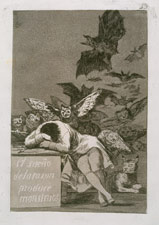 |
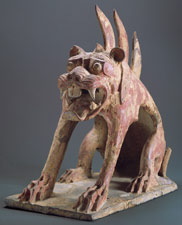 |
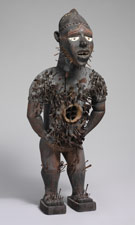 |
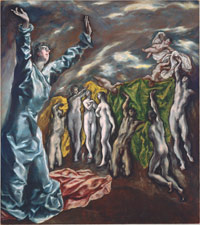 |
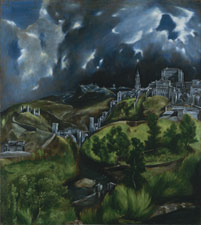 |
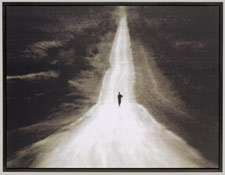 |
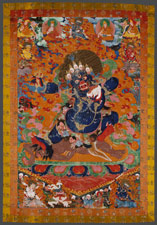 |
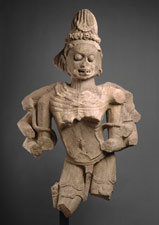 |
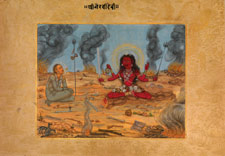 |
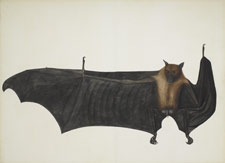 |
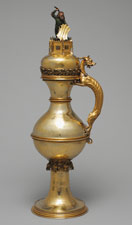 |
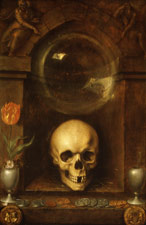 |
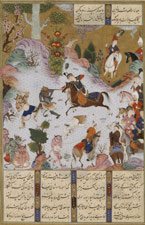 |
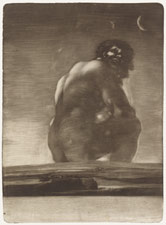 |
Works of art in order of appearanceLast Updated: June 22, 2015. Not all works of art in the Museum's collection may be on view on a particular day. For the most accurate location information, please check this page on the day of your visit. |
||
 |
The Sleep of Reason Produces Monsters: Plate 43 of The Caprices (Los Caprichos) 1799 Francisco de Goya y Lucientes (Spanish) Etching, aquatint, drypoint, and burin Gift of M. Knoedler & Co., 1918 (18.64) More information: The Collection Online Not on view
|
 Drawings and PrintsSecond Floor
Drawings and PrintsSecond Floor |
 |
Tomb guardian (zhenmushou) Northern Wei to Northern Qi dynasties, mid- to late 6th century China Earthenware with pigment Purchase, Ann Eden Woodward Foundation Gift, 1979 (1979.438) More information: The Collection Online Not on view
|
 Asian ArtSecond Floor
Asian ArtSecond Floor |
 |
Mangaaka Power Figure (Nkisi N'Kondi) second half of 19th century Democratic Republic of Congo or Angola, Chiloango River Region; Kongo Wood, metal, resin, enamel Purchase, Lila Acheson Wallace, Drs. Daniel and Marian Malcolm, Laura G. and James J. Ross, Jeffrey B. Soref, The Robert T. Wall Family, Dr. and Mrs. Sidney G. Clyman, and Steven Kossak Gifts, 2008 (2008.30) More information: The Collection Online Not on view
|
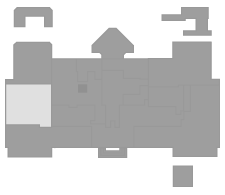 Arts of Africa, Oceania, and the AmericasFirst Floor
Arts of Africa, Oceania, and the AmericasFirst Floor |
 |
The Vision of Saint John 1608–14 El Greco (Domenikos Theotokopoulos) (Greek) Oil on canvas (top truncated) Rogers Fund, 1956 (56.48) More information: The Collection Online Not on view
|
 European PaintingsSecond Floor
European PaintingsSecond Floor |
 |
View of Toledo ca. 1597 El Greco (Domenikos Theotokopoulos) (Greek) Oil on canvas H. O. Havemeyer Collection, Bequest of Mrs. H. O. Havemeyer, 1929 (29.100.6) More information: The Collection Online Not on view
|
 European PaintingsSecond Floor
European PaintingsSecond Floor |
 |
Border #8 1997–98 Michal Rovner (Israeli) Paint on canvas Purchase, The Horace W. Goldsmith Foundation Gift, 1999 (1999.240) © Michal Rovner More information: The Collection Online Not on view
|
 PhotographsSecond Floor
PhotographsSecond Floor |
 |
Yama mid-17th–early 18th century Tibet Distemper on cloth Purchase, Florance Waterbury Bequest, 1969 (69.71) More information: The Collection Online Not on view
|
 Asian ArtSecond Floor
Asian ArtSecond Floor |
 |
Chamunda, the Horrific Destroyer of Evil 10th–11th century India, Madhya Pradesh Sandstone Purchase, Anonymous Gift and Rogers Fund, 1989 (1989.121) More information: The Collection Online Not on view
|
 Asian ArtSecond Floor
Asian ArtSecond Floor |
 |
The Goddess Bhairavi Devi with Shiva ca. 1630–35 India Opaque watercolor and gold on paper Lila Acheson Wallace Gift, 2011 (2011.409) More information: The Collection Online Not on view
|
 Islamic ArtSecond Floor
Islamic ArtSecond Floor |
 |
Great Indian Fruit Bat ca. 1777–82 Circle of Bhawani Das (Indian) India (Calcutta) Pencil, ink, and watercolors on paper Purchase, Anonymous Gift, Cynthia Hazen Polsky Gift, Virginia G. LeCount Bequest, in memory of The LeCount Family, 2007 Benefit Fund, Louis V. Bell, Harris Brisbane Dick, Fletcher, and Rogers Funds and Joseph Pulitzer Bequest, and Gift of Dr. Mortimer D. Sackler, Theresa Sackler and Family, 2008 (2008.312) More information: The Collection Online Not on view
|
 Islamic ArtSecond Floor
Islamic ArtSecond Floor |
 |
Ewer with Wild Man Finial ca. 1500 German; Made in Nuremberg Silver, silver-gilt, painted and enameled decoration The Cloisters Collection, 1953 (53.20.2) More information: The Collection Online Not on view
|
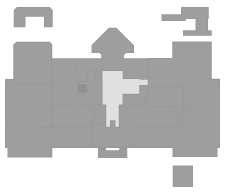 Medieval Art and The CloistersFirst Floor
Medieval Art and The CloistersFirst Floor
|
 |
Vanitas Still Life 1603 Jacques de Gheyn the Elder (Dutch) Oil on wood Charles B. Curtis, Marquand, Victor Wilbour Memorial, and The Alfred N. Punnett Endowment Funds, 1974 (1974.1) More information: The Collection Online Not on view
|
 European PaintingsSecond Floor
European PaintingsSecond Floor |
 |
Tahmuras Defeats the Divs: From the Shahnama (Book of Kings) of Shah Tahmasp ca. 1522–24 Attributed to Sultan Muhammad (Iranian) Iran, Tabriz Colors, ink, silver, and gold on paper Gift of Arthur A. Houghton Jr., 1970 (1970.301.3) More information: The Collection Online Not on view
|
 Islamic ArtSecond Floor
Islamic ArtSecond Floor |
 |
Giant by 1818 Francisco de Goya y Lucientes (Spanish) Spanish Burnished aquatint, 1st state Harris Brisbane Dick Fund, 1935 (35.42) More information: The Collection Online Not on view
|
 Drawings and PrintsSecond Floor
Drawings and PrintsSecond Floor |
© 2011 The Metropolitan Museum of Art |
||

